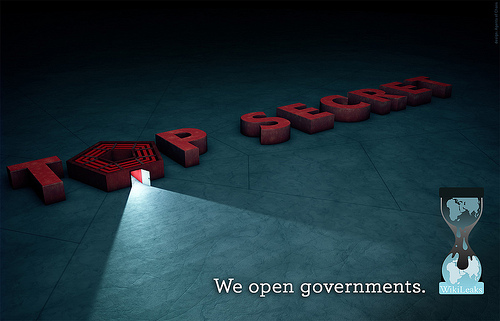Since the release of the State Department cables by Wikileaks, I’ve sat back and watched as the journalism world has gone through convulsions about the morality of capitalizing on these secrets.
 It’s been a fascinating, and illuminating, charade. As the fourth estate, the media would like to portray themselves as an unbiased, objective entity that maintains balance in society. Yet, inherently, the media is just as guilty of self-interest as anyone else in this whole mess.
It’s been a fascinating, and illuminating, charade. As the fourth estate, the media would like to portray themselves as an unbiased, objective entity that maintains balance in society. Yet, inherently, the media is just as guilty of self-interest as anyone else in this whole mess.
Yes, the State Department specifically, and the United States (and maybe other) governments would like to keep the lid on the memos. They see their credibility in talking with other nations on the line.
Julian Assange sees this, as pointed out in the great piece by zunguzungu, where Assange is quoted as saying:
Authoritarian regimes give rise to forces which oppose them by pushing against the individual and collective will to freedom, truth and self-realization. Plans which assist authoritarian rule, once discovered, induce resistance. Hence these plans are concealed by successful authoritarian powers. This is enough to define their behavior as conspiratorial.
Assange sees a world where transparent and open government subvert the power and authority of the same government and so there is a natural tendency (he calls it conspiracy) to hide what happens inside.
I agree that this dichotomy exists in some areas of government, but the diplomatic cables are common sense – for all involved. Keep them hidden as there is a potential that revelation can increase safety risks, decrease operational security and reduce negotiation power. Successful negotiations derive from a position of power and everyone knows this. This is not something that amounts to some great conspiracy.
Meanwhile, the media is on the sideline, their power usurped from this rogue operative with a rogue website. Instead of the New York Times or Washington Post benefitting from the receipt of leaked information as has been the case in their traditional past (see Watergate), an upstart “news organization” is stealing their thunder. Sure the Times and a variety of other media outlets were given the data eventually, but the arbiter of information was no longer them.
While the media wrings their hands over a contrived battle between the morality of publishing leaked, national security documents and preservation of national secrets, the bigger capitalistic battle is happening and that overshadows journalistic sense of responsibility.
The ability to be first is being tainted here. While Wikileaks promises to distribute new information, acting as a benevolent dictator, to news organizations, these news organizations are capitulating their responsibilities simply to make sure they have some crumbs off of Assange’s table.
No one, certainly, is suggesting that news outlets should become a lap-dog, as I have heard toss around, of the government, bowing to their every will and whim. Certainly not, lest we live in a Communist system. However, the media is expected to operate in a suitably responsible way.
In this case, the media knows that they are on the outs. In a last gasp of industry-pride, they have sacrificed themselves in a last-ditch effort to remain relevant. Put in another way, they have come to serve themselves instead of the people they exist to serve.
Of course, this hasn’t happened overnight. No, in fact, many years of budget cuts, acquisitions, mergers and staff reductions have caused the media industry to alter how they operate and approach stories. It’s less likely that you’ll have a Bob Woodward and Carl Bernstein hitting the trenches to uncover a conspiracy so deep that it reaches the President of the United States. No, that would require far more time and resources – and frankly, better reporters – than exist in todays media.
So with not a thought to their forefathers, the media of the 21st century makes decisions of national security to protect their own industry than serve the constituents who consume their journalism everyday. I wish it weren’t so.
Photo by Photoserra

